European Parliament elections take place June 6-9 across the bloc. How will they impact migration to – and within – Europe? We've outlined every party's position on migration.
Europe's voters will head to the polls in early June to determine the new makeup of the European Parliament, which decides the budget of the European Union and adopts laws together with the Council of Europe.
The European Union is Europe's federal body. All 27 member states are bound to the laws it passes.
Although many decisions about migration are made in individual countries themselves, some of the larger moves are made at the EU level. An overhaul of the migration system in Europe would need to ultimately be decided by the EU, for example.
Seven parties
The European Parliament is made up of seven parties: The European People's Party (EPP) holds the most spots, with 177, followed by the Progressive Alliance of Socialists and Democrats (S&D) with 140 and the Renew Europe party with 102.
The rest of the parties – the European Greens/ European Free Alliance, European Conservatives and Reformists, the Identity and Democracy group and The Left in the European Parliament – each hold fewer than 100 seats, with 72, 68, 59 and 37, respectively.
All of these seats will be up for grabs in the upcoming election.
Party manifestos
Ahead of the races, parties release manifestos outlining their positioning on topics relevant to voters, like climate, defense and healthcare.
We will outline each of the parties' positions on top migration issues, such as management of EU border control agency Frontex, search and rescue operations in the Mediterranean and internal border checks.
Although party views largely differ when it comes to migration policy, all have one goal in common: getting tough on trafficking. Each of the seven manifestos makes a point to condemn people smuggling operations.
European People's Party
The center-right European People's Party (EPP) holds the most seats in the EU Parliament. It is made up of Germany's Christian-Democrat CDU/CSU, the Republicans of France and Italy's Forza Italia, among others.
Politico polling predicts the EPP will lose two seats in the upcoming election, bringing the party's total from 177 to 175.
Positioning on Frontex
In its manifesto, the EPP pledges to "triple Frontex staff to 30,000" and increase the EU border agency's budget in order to help transform it into a "real European border and coast guard."
According to the party, Frontex's mandate should focus on three specific points: preventing "illegal" immigration to the EU, patrolling the bloc's external borders and "increasing the return of illegal migrants to their countries."
Border checks
The EPP pledges to strengthen the bloc's external borders through better screening of arriving migrants, explaining that the external border should be "comprehensively and electronically" monitored. Without these sorts of protocols, the party said it "cannot exclude" controls at internal borders.
Positioning on admittance of Bulgaria and Romania to Schengen
The party calls for Bulgaria and Romania's admission to the EU Schengen zone "as soon as possible" to better control migration into the bloc and reduce the need for internal border checks. Many migrants cross into the bloc from the east via these two countries.
Third countries
In its manifesto, the EPP expressed interest in sending prospective asylum seekers to "safe third countries" – a proposal that echoes the UK's Rwanda plan and Italy's Albania plan.
"We want to implement the concept of safe third countries," the party wrote. "Anyone applying for asylum in the EU could also be transferred to a safe third country and undergo the asylum process there. In case of a positive outcome, the safe third country will grant protection to the applicant on-site."
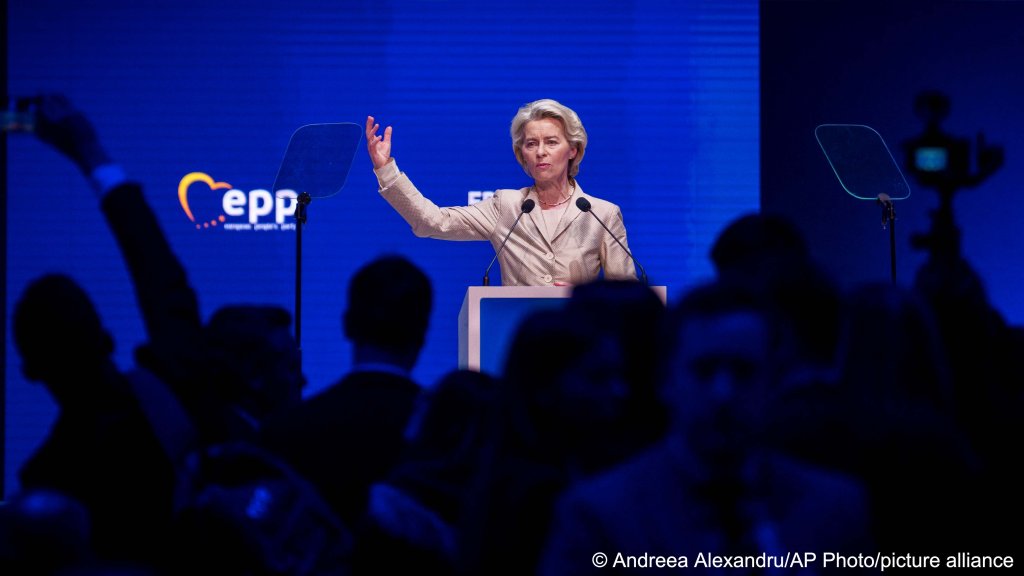
Progressive Alliance of Socialists and Democrats
The center-left Progressive Alliance of Socialists and Democrats (S&D) holds the second-most seats in EU Parliament and is made up of representatives from labor, socialist and social democrat parties across Europe.
Politico polling predicts S&D will gain five seats in the upcoming election, bringing the party's total from 140 to 145.
Positioning on search and rescue operations in the Mediterranean
In its manifesto, the S&D said it supports a European mission for search and rescue in the Mediterranean. Currently most search and rescue operations at sea are facilitated by NGOs and charities. The Italian, Greek and Spanish coast guards also facilitate operations, but only near the country's coasts.
The party added that it "will never criminalize humanitarian assistance."
Border checks
Without giving any specifics, the party said it will ensure the EU's external borders are "strengthened, managed and controlled effectively, while protecting the safety and rights of people."
Third countries
Unlike the EPP, the S&D said that although it promotes "transparent partnerships with countries of origin and transit", it does not stand for "any form of border externalization."
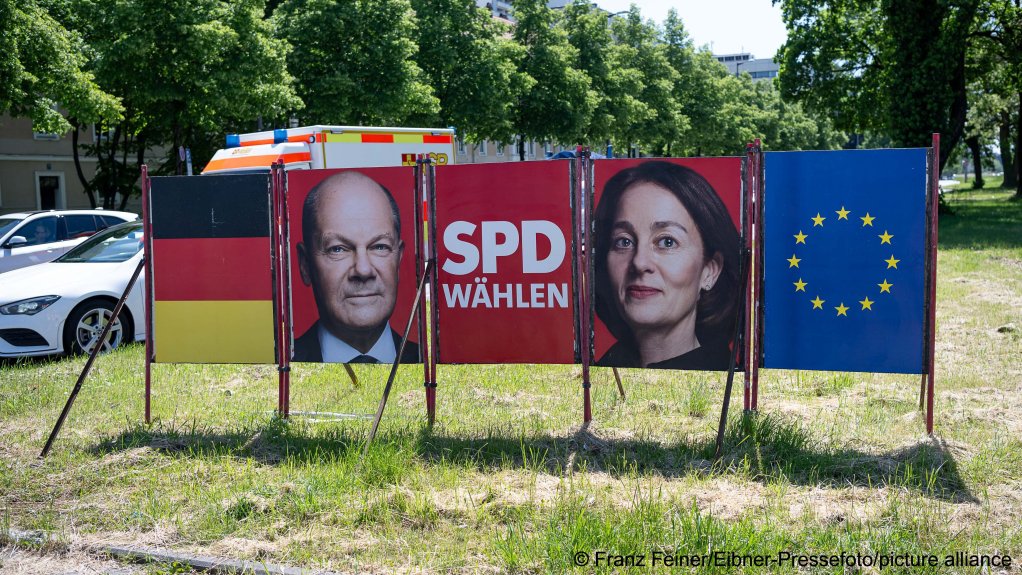
Renew Europe
Renew Europe is an economically liberal pro-EU party made up of a number of different parties, including ALDE (All Liberal and Democrats in Europe), the EDP (European Democratic Party), Macron's Renaissance and other national parties. It has a center-right and a center-left faction.
Politico polling predicts Renew Europe will lose 21 seats in the upcoming election, bringing the party's total from 102 to 81.
Renew Europe's party manifesto included limited concrete information about its plans regarding migration, although it did call for economic legal pathways for labor migrants "so that European economies can have the necessary workforce for their growth" amid bloc-wide labor shortages.
ALDE, the largest party in the coalition, released its own manifesto with a couple of specifics on its migration plans, which we have outlined below.
Positioning on Frontex
ALDE pledged in its manifesto to "reform Frontex … for effective control of EU external borders with respect for human rights." The party did not list specifics on how it plans to do this.
Positioning on search and rescue operations in the Mediterranean
ALDE also said it will "launch a European Action Plan" for Mediterranean search and rescue operations "prioritizing the safety and dignity of those in distress."
The party said it would ensure pushbacks, mistreatment of migrants and other violations of their rights are met with consequences.
Third countries
ALDE, like the EPP, pledged support for third-country agreements "to halt irregular migration to the EU, while upholding and protecting human rights."
Also like the EPP, the group said it supports the establishment of "EU-managed common facilities outside the EU borders for asylum seekers, responsible for streamlined application processing."
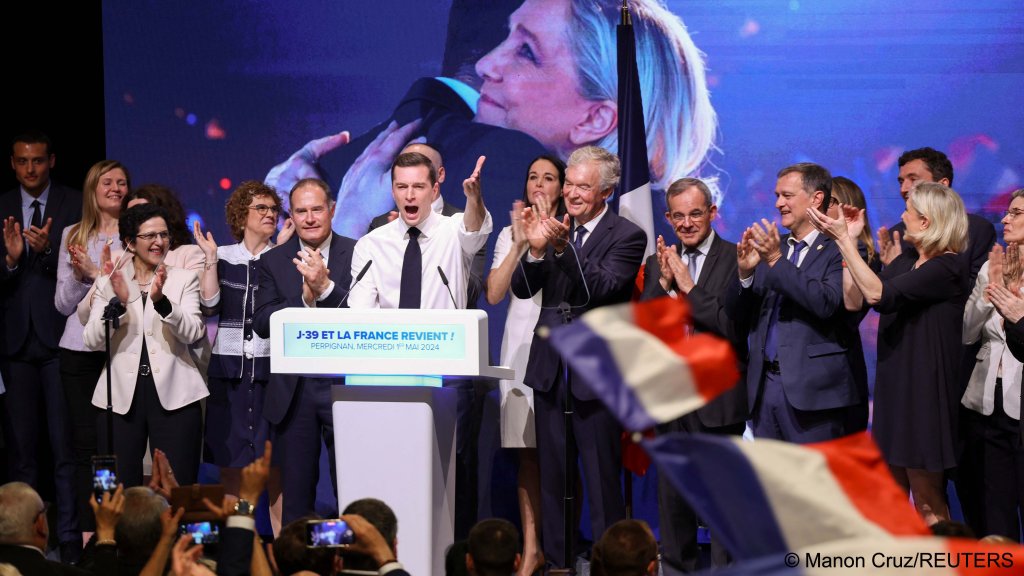
European Greens/European Free Alliance
The European Greens/European Free Alliance (G-EFA) party is a coalition of many different European parties, most of them center-left, that are specifically (but not exclusively) focused on climate issues.
Politico polling predicts the European Greens/European Free Alliance party will lose 29 seats in the upcoming election, bringing the party's total from 72 to 43.
Positioning on Frontex/search and rescue operations in the Mediterranean
In its manifesto, G-EFA calls for an EU-funded and led search and rescue mission in the Mediterranean and for the strengthening of the "humanitarian mandate and responsibility" of Frontex.
It added that it aims for "stronger control of the agency also through national parliaments together with the European Parliament."
The party said it wants to end the criminalization of humanitarian assistance and said asylum seekers should be guaranteed access to legal help.
Positioning on coordinated EU migration system
The party called for a coordinated bloc-wide system of asylum in the EU in which member states share responsibility for applications.
"For us, it is clear that we need a mandatory relocation mechanism," the party wrote.
It called for the replication of the Temporary Protection Directive (used for refugees fleeing Ukraine when the war started) and "EU visas for Human Rights and Environmental Defenders."
The party also said it aims to provide legal protection for people displaced to due climate crises and that the "specific vulnerability of LGBTQIA+ asylum seekers must be addressed."
Border checks
The party said internal border checks instituted in the Schengen zone should be reversed.
It also said pushbacks at the EU's borders "must end."
Positioning on admittance of Bulgaria and Romania to Schengen
The party said it supports Bulgaria and Romania's admittance to the Schengen zone.
Third countries
"We fiercely oppose so-called 'migration deals', such as that with Tunisia, where the EU pays off countries to keep out migrants," the party wrote. "Any cooperation with third countries on migration needs a human rights assessment. Making development cooperation with third countries conditional on 'migration' management is unethical."
More proposals
The party also called for a "comprehensive campaign" for the regularization of people who have been living in the bloc without papers long term.
It added that it aims to develop a new EU Migration Code that would offer visa opportunities for family reunification and work. The code, they wrote, "should also allow migrants already in the EU to change their status, for instance from student to employee."
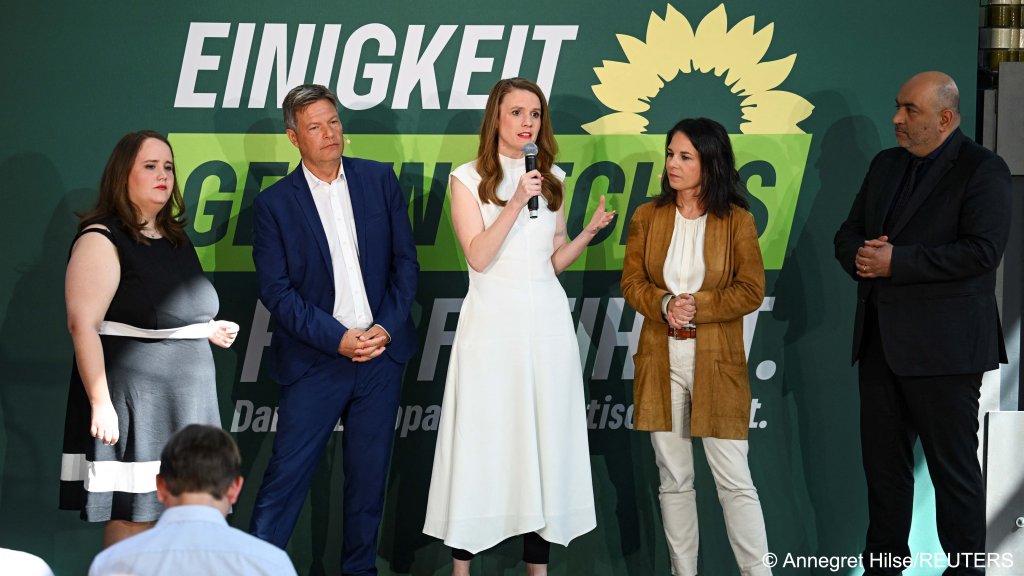
European Conservatives and Reformists
The center-right European Conservatives and Reformists (ECR) is considered a "soft Eurosceptic" party. The group's main political objective is to ensure the European Union doesn't become a superstate that meddles in country-specific power and politics. It is considered "soft" Eurosceptic because it does not entirely oppose the existence of the European Union. It is mainly composed of Poland's Law and Justice (PiS) party, but contains members from across the bloc.
Politico polling predicts ECR will gain five seats in the upcoming election, bringing the party's total from 68 to 73.
Positioning on Frontex
In its manifesto, ECR wrote that it is committed to the reinforcement of agencies like Frontex and Europol to patrol and secure the bloc's external borders.
Positioning on coordinated EU migration system
The party specifically pledged to fight the "exploitation of migrant flows as a hybrid weapon by Eastern and Southern neighbors, aimed at destabilizing and heightening tensions within the EU."
This likely refers to actions allegedly made by Russian President Vladimir Putin, who has reportedly been sending migrants to Russia's western border to cross through Russia-friendly neighbors like Belarus into the bloc.
Border checks
Without providing specifics, the party said it proposes a member state-financed "comprehensive strategy for border security that covers all possible points of entry, including air, land, and sea borders."
Third countries
The party said it supports the externalization of migration management and would seek to ensure that "the majority of applications for international protection are assessed directly outside of the EU."
'Genuine refugees'
Finally, the party said it "will insist on granting asylum only to genuine refugees", without explaining what a "genuine refugee" is.
Identity and Democracy group
The far-right Identity and Democracy (ID) group is composed of nationalist parties from across the bloc, including Italy's La Lega party, Germany's Alternative for Germany (AfD) party and France's National Rally.
Politico polling predicts ID will gain 24 seats in the upcoming election, bringing the party's total from 59 to 83.
The Identity and Democracy group has not released a 2024 manifesto, but reportedly says its aims for the next five years remain the same as those announced ahead of the 2019 elections.
In the 2019 manifesto, the party called for better protection of EU external borders, adding that "every nation has the right to protect, control and monitor its own borders."
It also called for more EU-led deportations of "illegal and criminal immigrants."
The group added that national identities should be "embraced, respected and preserved," which it said explains why it opposes "uncontrolled mass immigration."
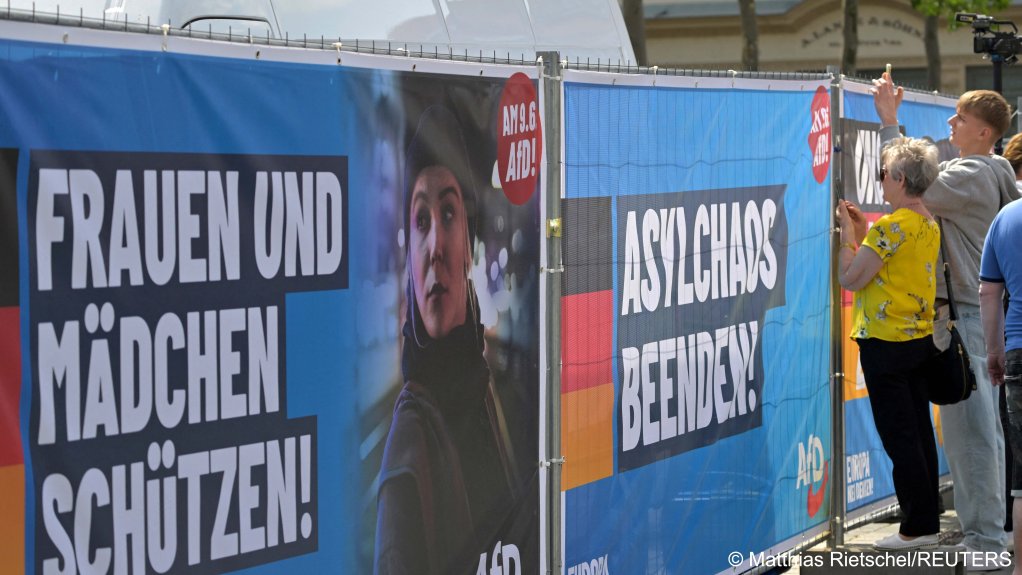
The Left in the European Parliament
The Left in the European Parliament is composed of far-left parties from across the bloc.
Politico polling predicts the Left will lose five seats in the upcoming election, bringing the party's total from 37 to 32.
Positioning on Frontex
In its manifesto, the Left calls for the "dissolution" of Frontex and the abolishment of the Dublin Agreement (this treaty requires migrants to apply for asylum in the first country they arrive in upon entrance to the EU).
Positioning on coordinated EU migration system
The party called for the cancellation of the EU's New Pact on Migration and Asylum, signed on 20 December 2023 "because it condemns refugees to detention and, in most cases, deportation."
In its place, the party called for "a common reception system in the European Union based on criteria of inter-territorial solidarity and respect for the rights of migrants and refugees."
Third countries
The party said it opposes the externalization of EU borders and the "relocation of detention centers" to non-EU countries.
